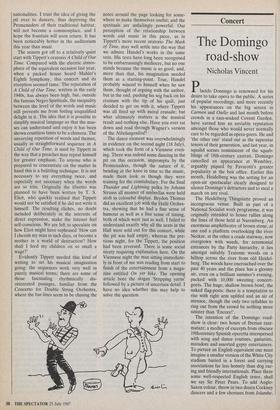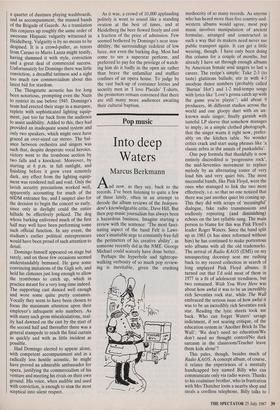Concert
The Domingo road-show
Nicholas Vincent
Placido Domingo is renowned for his desire to take opera to the public. A series of popular recordings, and more recently his appearances on the big screen in Carmen and Otello and last month before crowds in a rain-soaked Covent Garden, have earned him an enviable reputation amongst those who would never normally care to be regarded as opera-goers. He and `the other one' stand out as the superstar tenors of their generation, and last year, in squalid scenes reminiscent of the squab- blings of 18th-century castrati, Domingo cancelled an appearance at Wembley, arguably piqued by. Pavarotti's greater popularity at the box office. Earlier this month, Heidelberg was the setting for an open-air spectacular clearly designed to silence Domingo's detractors and to steal a march on any rival.
The Heidelberg Thingstatte proved an incongruous venue. Built as part of a National Socialist work programme, it was originally intended to house rallies along the lines of those held at Nuremberg. An enormous amphitheatre of brown stone, at one end a platform overlooking the river Neckar, at the other a crude stairway, now overgrown with weeds, for ceremonial entrances by the Party hierarchy, it lies amongst suitably Teutonic woods on a hilltop across the river from old Heidel- berg. The woods have encroached over the past 40 years and the place has a gloomy air, even on a brilliant summer's evening, packed with 10,000 sweating concert- goers. The huge, shallow brown bowl, the naked flag-posts: there is a temptation to rise with right arm uplifed and an air of menace, though the only two syllables to ring out from the crowd be nothing more sinister than 'Encore!'.
The intention of the Domingo road- show is clear: two hours of Iberian razz- matazz; a medley of excerpts from obscure 19th:century Spanish operetta interspersed with song and dance routines, guitarists, matadors and assorted gypsy entertainers. To picture an English equivalent one must imagine a smaller version of the White City stadium buried in a forest and carrying associations far less homely than dog rac- ing and friendly internationals. Place there some well-respected English tenor, shall we say Sir Peter Pears. To add Anglo- Saxon colour, throw in two dozen Cockney dancers and a few choruses from lolanthe, a quartet of dustmen playing washboards, and as accompaniment, the massed bands of the Brigade of Guards. As a translation this conjures up roughly the same order of awesome Hispanic vulgarity witnessed in Heidelberg. Vulgarity is by no means to be despised. It is a crowd-puller, as tenors from Caruso to Mario Lanza might testify, having slummed it with style, conviction and a great deal of commercial success. Unfortunately for Domingo there was little conviction, a dreadful tattiness and a sight too much raw commercialism about this latest bid for stardom.
The Thingstatte acoustic has for long been notorious, prompting even the Nazis to restrict its use before 1945. Domingo's team had erected their stage in a marquee, replete with sophisticated lighting equip- ment, just too far back from the audience to assist audibility. Added to this, they had provided an inadequate sound system and only two speakers, which might once have graced an over-sized car stereo. The bal- ance between orchestra and singers was such that, despite desperate vocal heroics, victory went to the trombone section by two falls and a knockout. Moreover, by starting at 6 p.m. in full sunlight, and finishing before it grew even remotely dark, any effect from the lighting equip- ment was rendered null and void. Only the lavish security precautions worked well, apparently accounting for much of the 60DM entrance fee, and I suspect also for the decision to begin the concert so early, since only in daylight could the entire hillside be effectively policed. The dog whose barking enlivened much of the first half may well have been performing some such official function. In any event, the stadium's earlier political entrepreneurs would have been proud of such attention to detail.
Domingo himself appeared on stage but rarely, and on those few occasions seemed understandably bemused. He gave some convincing imitations of the Gigli sob, and held his climaxes just long enough to allow the trombones to catch up, which in practice meant for a very long time indeed. The supporting cast danced well enough and wore some quite pretty costumes. Vocally they seem to have been chosen to focus the maximum attention upon their employer's infrequent solo numbers. As with many such gross miscalculations, real- ity had dawned on the cast by the start of the second half and thereafter there was a general stampede to reach the final curtain as quickly and with as little incident as possible.
Had Domingo elected to appear alone, with competent accompaniment and in a radically less hostile acoustic, he might have proved an admirable ambassador for opera, justifying the commercialism of his venture and meeting his rivals on their own ground. His voice, when audible and used with conviction, is enough to stun the most sceptical into silent respect. As it was, a crowd of 10,000 applauding politely is wont to sound like a standing ovation at the best of times, and at Heidelberg the beer flowed freely and cost a fraction of the price of admission. Few seemed bothered by Domingo's near inau- dibility, the surroundings redolent of low farce, nor even the barking dog. Most had come to see a superstar perform, and preferred to pay for the privilege of watch- ing him do it badly in the open air rather than brave the unfamiliar and stuffier confines of an opera house. To judge by the vast back-up of container lorries and security men in 'I love Placido' T-shirts, the promotors remain convinced that there are still many more audiences awaiting their cultural baptism.



















































 Previous page
Previous page